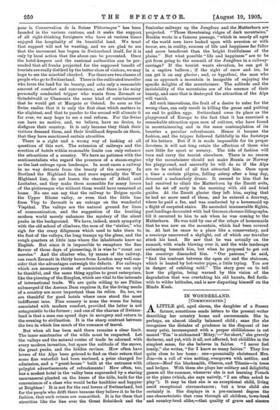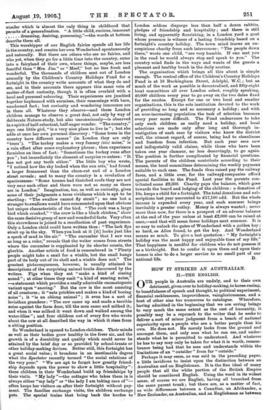A LITTLE girl, aged eleven, the daughter of a Sussex farmer,
sometimes sends letters to the present writer describing her country home and amusements. She is, perhaps, an almost ideally balanced child ; sane (for she recognises the dictates of prudence in the disposal of her many pets), inconsequent with a proper childishness (a cat named ' Tim ' is nicknamed Mitey,'—" for short," she gravely declares), and yet, with it all, not affected, but childlike in the simplest sense, for she believes in fairies. "I never feel lonely," she writes, "for I know so many fairies." They live quite close to her home : one—prosaically christened Mrs. Jim—in a roll of wire netting, overgrown with nettles, and others—Meef the blacksmith, Oberon, and Titania—in trees and hedges. With them she plays her solitary and delightful games all the summer, whenever she is not learning French or the piano (which, she says naively, "I am often asked to play "). It may be that she is an exceptional child, living amid exceptional circumstances ; but a true child she certainly is. She displays in a pre-eminent degree the one characteristic that runs through all children, town-bred and country-bred alike,—that quality of grave and sincere
Wonder which is almost the only thing in childhood that permits of a generalisation. "A little child, curious, innocent dreaming, desiring, possessing,"—the words at bottom describe them all.
This worshipper of our English fairies spends all her life in the country, and creates her own Wonderland spontaneously and naturally. But there are others who see no fairies, and who yet, when they go for a little time into the country, enter into a fairyland of their own, where things, maybe, are less fanciful than "Mrs. Jim" or " Meef," but no less fresh and wonderful. The thousands of children sent out of London annually by the Children's Country Holidays Fund for a fortnight in the country write accounts of what they do and see, and in their accounts there appears this same vein of matter-of-fact curiosity, though it is often overlaid with a local and personal colouring. Their experiences are jumbled together haphazard with surmises, their reasonings with bare, unadorned fact ; but curiosity and wondering innocence are in them all. Whatever they observe—and these London children manage to observe a great deal, not only by way of deliberate Nature-study, but also unconsciously—is observed in a spirit of half-reluctant, half-eager wonder. "The country," says one little girl, "is a very nice place to live in" ; but she adds at once her own personal discovery : "Some trees in the country have different names" (in London they are only "trees"). "The turkey makes a very funney (sic) noise," is a vain effort after some explanatory phrase ; then experience furnishes an item of fact : "Sometimes the turkey runs after you"; but immediately the element of surprise re-enters : "It has not got any teeth either." The little boy who wrote, "I noticed how the sky looked when the sun sets," had found a larger firmament than the clean-cut end of a London street reveals ; and to many the country is a revelation of spaciousness: "Some houses had thatched roofs they are not very near each other and there were not so many as there are in London." Imagination, too, as well as curiosity, gives some of their judgments a terse vividness which is apt to be startling : "The swallow cannot fly strait"; no one but a stranger to swallows would have commented upon that obvious but unique characteristic of the bird. "The rook was a large bird which croaked," "the crow is like a black chicken," show the same decisive grasp of new and wonderful facts. Very often this shrewdness is joined to a recollection of past experience. Only a London child could have written thus : "The lark flys strait up in the sky. When you look at it [it] looks just like a speck of mud in the air." "The cucumber that I saw was as long as a ruler," reveals that the writer comes from streets where the cucumber is supplanted by its shorter cousin, the gherkin. Another article of food is remembered in "Plenty people might take a snail for a winkle, but the snail hangs part of its body out of its shell and a winkle does not." The greatest picturesqueness, however, is usually attained in descriptions of the surprising animal traits discovered by the writers. Pigs when they eat "make a kind of sissing sound "; at other times they emit "a kind of snaring noise," —a statement which provides a really admirable onomatopoeic variant upon "snoring." But the cow is the most amazing of all creatures ; it "eats prickles and makes a kind of booing noise "; it "is an oblong animal" ; it even has a sort of leviathan grandeur : "The cow came up and made a terrible noise against the farm door, till the men came and milked it; and when it was milked it went down and walked among the water-lilies "; and four children out of every five who wrote about the cow at all described the way in which it rises from a sitting position.
So Wonderland is opened to London children. Their minds as well as their bodies grow healthy in the freer air, and the growth is of a durability and quality which could never be attained by the brief day or so provided by school-treats or other holiday-making devices. Better still, this fortnight has a great social value ; it broadens in an inestimable degree what the Spectator recently termed "the social relations of the very poor." "We are apt to forget how greatly friend- ship depends upon the power to show a little hospitality": these children in their Wonderland build up friendships by their visits. "My lady "—the cottager who takes them in is always either "my lady" or "the lady I am taking care of "— often keeps her visitors on after their fortnight without pay- ment. The families exchange visits, the children exchange pets. The special trains that bring back the hordes to
London seldom disgorge less than half a dozen rabbits, pledges of friendship and hospitality ; and there is still living, and apparently flourishing, in a London yard a goat whose presence is witness of a lasting friendship based on a fortnight's country holiday. The town mind learns an un- suspicious charity from such intercourse : "The people down there," wrote one child, "are very humble. If one met you in the road he would always stop and speak to you." The country mind finds in the ways and wants of the guests a pleasant and healthy break in the daily routine.
The organisation which brings all this about is simple enough. The central office of the Children's Country Holidays Fund is at 18 Buckingham Street, Adelphi, W.C. ; but as much of the work as possible is decentralised, and fifty-eight local committees all over London select, roughly speaking, 40,000 children every year to go away on the two dates fixed for the exodus. Except for one or two local and smaller organisations, this is the sole institution devoted to the work of providing so long and so necessary a holiday ; and with an ever-increasing population the task of selection becomes every year more difficult. The Fund endeavours to take only such children as really need a holiday, and local selections are made only after long and thorough in- vestigation of each case by visitors who know the district well, the utmost regard, of course, being had to cleanliness and freedom from infection. But each year sees new and indisputably valid claims, while those who have been taken one year clamour, no less deservingly, to go again. The position is further complicated by financial questions. The parents of the children contribute according to their means, the local committees determining the weekly payment suitable to each case. The funds thus raised pay the railway fares, and a little over, for the railway] companies afford special facilities to the Fund. Last year the parents con- tributed some 29,300. Charity pays the balance, which goes towards the board and lodging of the children : a donation of 10s. keeps a child for a fortnight. The total donations and sub- scriptions last year amounted to £17,100 odd. But the whole income is expended every year, and each summer brings inevitably a greater outlay. Money is always wanted ; never more than now, for there is a prospect of an adverse balance at the end of the year unless at least 22,000 can be raised at once,—and that will mean fewer holidays next summer. It is so easy to unlock the gates of Wonderland with a golden key ; so hard, as Alice found, to get the key. And Wonderland means so much. To give a last quotation : "My fortnight's holiday was the most happy and enjoyable time of my life." That happiness is needful for children who do not possess it as a birthright. But to confer it upon them and upon their homes is also to do a larger service to no small part of our national life. D.



































 Previous page
Previous page